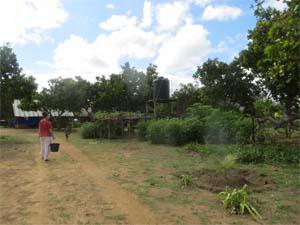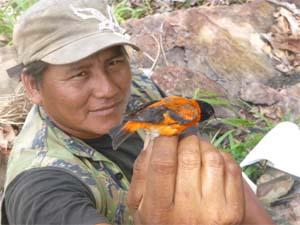Chung Liu
Rustic, shade-grown cacao and coffee farms are widely recognised to provide food, habitat, and protection for a diverse range of bird species, allowing for biodiversity conservation efforts to benefit local subsistence and livelihood strategies. This project will research existing local coffee and cacao production, critically assess plant species at Wapishana household farms and other sites that provide crucial habitats for local bird species, and establish a shade nursery where various seedlings will be cultivated for eventual transplant at each site.

Kaiambe Ranch, site of planned shade-nursery.
The South Rupununi Conservation Society (SRCS) is a community-based conservation organisation that has been involved in endangered Red Siskin (Carduelis cucullata) conservation research since its discovery in Guyana by the Smithsonian Institute in 2001. The vast majority of SRCS Rangers are Wapishana or Macuxi subsistence farmers, and male heads of households, whose traditional farms on the forest-savannah border provide critical habitats for the Red Siskin and other local bird species. This Bird-Friendly Coffee project will involve Rangers, their families, and other interested Wapishana and Macuxi farmers in an approach to bird and biodiversity conservation intended to support traditional subsistence and livelihood strategies.

SRCS Ranger with a Red Siskin.
With support from local village communities, and guidance from the Smithsonian Migratory Bird Centre (SMBC), whose research has produced comprehensive and internationally-recognised criteria for Bird-Friendly Coffee, the SRCS will conduct an initial study of eight local household farming areas to determine local bird species present, composition of plant populations, and the feasibility of cultivating cacao, coffee, and other shade-grown cash crops, as well as other traditionally significant plants that have historically been successfully cultivated in the region. With the establishment of a shade nursery, the SRCS will subsequently cultivate cacao, coffee, and other plant seedlings for eventual transplant at each site.
A cautionary note: SMBC Bird-Friendly Coffee criteria were selected as the standard for this project due to their scientifically rigorous approach to tree biodiversity. As cacao, coffee, and other seedlings planted will take a minimum of three to five years to mature and produce fruit, this project will still have a very long waiting period before any potential crop can bear.
Grassroots environmental education is crucial to the success of this project, and the SRCS will focus on working with several farming households and some additional community volunteers who are interested in participating. The team will train and include three local youths to fulfil a wide range of roles in field research, nursery maintenance, and seedling transplant. The field research component is intended to foster further dialogue between Wapishana traditional ecological knowledge and modern scientific methods. The nursery and transplanting component will develop local capacity and commitment to continue with future conservation and reforestation projects, including utilising shade-grown cacao and coffee seedlings to maintain village hardwood species reserves, planting further fruit and NTFP seedlings at household farms, or leading village Primary School children to create their own nursery projects.